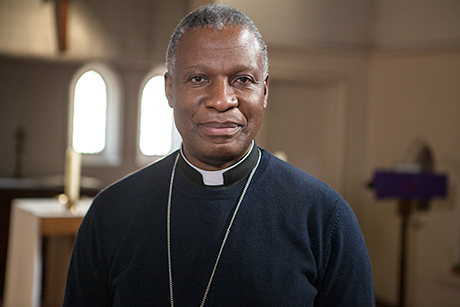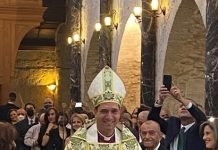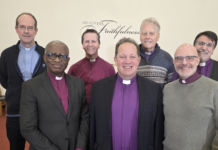Archbishop Thabo Makgoba of Cape Town has called on the South African government to condemn “loudly and clearly those who bomb health centres and places of refuge” in the Russian invasion of Ukraine.
Speaking at the launch of “Truth to Power”, an exhibition dedicated to the work of Archbishop Desmond Tutu, Archbishop Makgoba said he was distressed at South Africa’s “silence on the horrific bombing of health facilities and civilians in Ukraine.”
“Where is our ubuntu, our humanity?” he asked. “We Africans complain of the appalling indifference of many Europeans to the suffering of Africans when there is conflict on our continent. Are we seeking to mimic the Europeans in their lack of compassion, their lack of outrage at the suffering which women and children are subjected to? Do we want to reduce ourselves to their level?”
He added: “When Europeans turn on one another and go to war, the death and destruction they wreak on one another with their Cruise missiles far outstrips that ever seen in Africa. In the spirit of the Arch, we should be condemning loudly and clearly those who bomb health centres and places of refuge, and voicing our solidarity and our sympathy with the victims.”
The full text of his remarks on Ukraine follow:
“Three weeks ago I called on our government to condemn Russia’s invasion, on the grounds that whatever one’s views on the behaviour of NATO and the West, the invasion is a flagrant breach of the UN Charter. Sadly, on the same day, South Africa abstained from voting on a UN resolution demanding that Russia unconditionally withdraw its forces from Ukraine.
“President Ramaphosa has since said our government’s approach is aimed at helping create conditions for peace. But why should that have stopped us from voting to call for Russia’s withdrawal? Both Turkey and Israel voted for the UN resolution, and that has not stopped Russia from accepting those governments as mediators.
“More distressing right now is South Africa’s silence on the horrific bombing of health facilities and civilians in Ukraine. I learn that the resolution we are presenting to the UN General Assembly this week fails to condemn explicitly the targetting of civilians and the attacks on civilian infrastructure, including hospitals, schools and water facilities.
“Where is our ubuntu, our humanity? We Africans complain of the appalling indifference of many Europeans to the suffering of Africans when there is conflict on our continent. Are we seeking to mimic the Europeans in their lack of compassion, their lack of outrage at the suffering which women and children are subjected to? Do we want to reduce ourselves to their level?
“When Europeans turn on one another and go to war, the death and destruction they wreak on one another with their Cruise missiles far outstrips that ever seen in Africa. In the spirit of the Arch, we should be condemning loudly and clearly those who bomb health centres and places of refuge, and voicing our solidarity and our sympathy with the victims.”
Full text of his address
Dear Trevor, Dear Thandi, Mthunzi and Xabiso, Dear Nyaniso, Dear Mr Leonard Shenxane and Ms Lungi Morrison, thank you to all Tutu family members for gracing us with your presence, especially during your time of mourning. Be assured of our love and our prayers for Mama Leah and for each of you as you come to terms with life without your beloved husband, father and grandfather.
Minister Nathi Mthethwa, Mr Mayor, Dr Ramphele, Mr Kjellström-Matseke, Ms Emilia Potenza of the Apartheid Museum, the curator of this exhibition, Ms Phumi Nhlapo, the Acting CEO of the Foundation, Ms Piyushi Kotecha, the outgoing CEO,Members of the exhibition Reference Panel: in her absence, Dr Brigalia Bam, Dr Storey, former Dean Jones, Mr Gool and Mr Friedman, Apartheid Museum Board members, Foundation Board members,Trustees of the IP Trust,Staff of the Foundation and the Trust,and Friends all,
Good evening, and thank you warmly for inviting me to speak, and especially to the Apartheid Museum and the Foundation for this exciting exhibition.
Appropriately for this event, today the Church commemorates the incredible courage and integrity of Archbishop Oscar Romero of El Salvador, who was assassinated while celebrating Mass on this day in 1980. The church has since recognised him as a prophet of justice. His inspiration continues to be felt where people rise up to defend the poor, to strive for justice and to pursue hope that liberation will triumph. Hours before he was killed, he pleaded with the country’s security forces to disobey a reactionary, oppressive regime and to refuse orders to kill the poor, the peasants and those demonstrating in the streets. He remains a towering icon for all who, in the words of the Magnificat, “pull down the mighty from their thrones and raise up the lowly.” A luta continua, Oscar, prophet of justice, please pray for us!
The origins of the exhibition we are opening tonight go back for the church to an email I received four years ago from an independent researcher who knew me from my time teaching at Wits. My office responded warmly to the idea, so when Emilia formally approached us the following year and put together the outstanding reference group she has used as a sounding board, we were thrilled. We have to say that work still needs to be done by the wider heritage sector in South Africa on the contributions made to the struggle against apartheid by all our faith communities. Notwithstanding that, it is apt that an institution of such renown as the Apartheid Museum should begin the process of recognising the role of religious communities by focussing on the churches associated with the SACC, mediated through the activism of the Arch.
Congratulations on a magnificent job, Emilia, to you and your team: the picture researchers, the film makers, the museum staff, the financiers, the reference panel members and others. I know the Museum is going through tough times as a result of Covid, but I hope that an occasion will be found to give full recognition to your work as displayed in the Museum in Johannesburg.
Although the exhibition was curated and developed by the Museum in Johannesburg, its presence here in Cape Town was negotiated by Piyushi Kotecha, who not only brought it here but who added a number of unique and moving additional features for this venue. It is not my role to go into all the details, but I want to make particular mention of the way you have given public recognition to the nearly 20,000 people declared by the TRC as victims of human rights violations. The Arch used to say that in his theology there are no ordinary people – that all people are created in the image of God – so I will adopt his language and say you have lifted up in a unique way “so-called ordinary people”, not just the political actors and the heroines and heroes of the struggle, but people of all political persuasions and of none, who suffered in the conflict generated by apartheid.
That is wholly in keeping with the Arch’s values. Congratulations, Piyushi, you have brought distinction on yourself, and on the foundation, and you can complete your term as CEO proud both of your role in this exhibition and of laying a solid basis for the foundation’s future.
Congratulations also to you, Phumi, who as Chief Operating Officer played an instrumental role in the construction of the exhibit here, and to all your colleagues who assisted. And thank you for the excellent job you have done in recent weeks in promoting the exhibition.
This morning I was scheduled to accompany Mama Leah as a pastoral presence as she visited the exhibition. Sadly a taxi blockade stopped her from coming, but I am pleased to say that the Arch saw the exhibition as it was being completed before he died. We know how he reacted courtesy of Nontombi, who has recorded on her Facebook page that she previewed it with him and that “He was so moved by the work that the Foundation put into this.”
Since I am referring to the Arch having been brought to see the exhibition, I cannot let this occasion go by without making special mention of Mthunzi Gxashe, the Arch’s faithful and deeply-devoted aide in his last years. Mthunzi has truly been the Arch’s shadow, lauded everywhere one goes for his unfailingly polite, firm and loving care of the Arch, the embodiment of a superb diplomat. We owe you a huge debt of gratitude, Mthunzi, and on behalf of us all, thank you for your dedicated service.
Now, in the wake of the Arch’s death, we all face a transition. Whether we lived with him as family, whether we had frequent contact or little, we all lived under the shadow of his powerful presence in our lives. I had the privilege of previewing the exhibition and what it captures is part and parcel of keeping him and his ideals and values alive. It is now for us to work out, individually and collectively, how to give expression to the way in which he can live through us.
Those of us who had relationships with one another through our comradeship with him have to re-examine how we relate to one another. This is true for the church, even though he retired as Archbishop more than 25 years ago. It is true for his friends, whom he bound together with cords of love. And it will be true for the Foundation, which faces a transition in which it will be headed by a new, highly talented CEO and will hopefully work closely together with the Desmond Tutu Intellectual Property Trust.The greatest gift which we could give the Arch, his legacy and the world would be to let his values live in us in the way in which we treat one another and how we treat those who are not at the centre of society – not the VIPs but the poor, the marginalised and the suffering.
Transitions can be hard. But they can be eased if we emulate the qualities the Arch brought to bear in his relationships with others. I want to emphasise just two.
Firstly, the way in which he encouraged complete transparency in relationships. Sophie Mazibuko, who used to run the agency in the SACC which cared for the families of political prisoners in the days when I worked there as a student, has illustrated this best. “Baba is a straight forward and upright person,” she wrote in a tribute published by Buti Tlhagale and Itumeleng Mosala. She continued: “In fact his wife warned us from the start that if you do not want anything repeated, do not say it to him. In Xhosa we say, Ukhatywe lihashi esifubeni (he was kicked in the chest by a horse).” This quality of the Arch meant that if you wanted to say something to him about someone else, you better have told the other person beforehand. It eliminated gossip behind people’s backs and forced transparency.
The second quality I want to highlight is his passionate desire that we should build a new kind of society in South Africa, a more compassionate and caring society. In our outreach to our communities and the world, but also in our dealings with one another, let us emulate his compassion and caring. As a Foundation named for the Arch and our beloved Mama Leah, the bar has been set high for you if you are not to be just any NGO, but one which truly lives by and reflects his values.
I would not be true to the Arch’s example if I did not end with a sting in the tail.
Firstly, our country faces an election in just over two years. All of us, not just those in the Foundation, should be asking ourselves: the Arch was an outstanding leader – but do we have leaders in South Africa who are fit for purpose to take us into the future? What kind of leaders do we want in the years to come? What are the reforms we need to raise them up?
Secondly, I have to refer to the war in Ukraine. Three weeks ago I called on our government to condemn Russia’s invasion, on the grounds that whatever one’s views on the behaviour of NATO and the West, the invasion is a flagrant breach of the UN Charter. Sadly, on the same day, South Africa abstained from voting on a UN resolution demanding that Russia unconditionally withdraw its forces from Ukraine. President Ramaphosa has since said our government’s approach is aimed at helping create conditions for peace. But why should that have stopped us from voting to call for Russia’s withdrawal? Both Turkey and Israel voted for the UN resolution, and that has not stopped Russia from accepting those governments as mediators.
More distressing right now is South Africa’s silence on the horrific bombing of health facilities and civilians in Ukraine. I learn that the resolution we are presenting to the UN General Assembly this week fails to condemn explicitly the targetting of civilians and the attacks on civilian infrastructure, including hospitals, schools and water facilities.
Where is our ubuntu, our humanity? We Africans complain of the appalling indifference of many Europeans to the suffering of Africans when there is conflict on our continent. Are we seeking to mimic the Europeans in their lack of compassion, their lack of outrage at the suffering which women and children are subjected to? Do we want to reduce ourselves to their level?
When Europeans turn on one another and go to war, the death and destruction they wreak on one another with their Cruise missiles far outstrips that ever seen in Africa. In the spirit of the Arch, we should be condemning loudly and clearly those who bomb health centres and places of refuge, and voicing our solidarity and our sympathy with the victims.
I identified strongly with a tweet earlier this week from my neighbour in Makgoba’s Kloof, Tito Mboweni, who put it beautifully. “I hate wars. Period,” he said. “Can’t the UN or the Non-Aligned Movement re-engineer the Global Peace Movement. We don’t solve anything by shooting and bombing each other. Negotiations, mediation, arbitration, conciliation and peaceful co-existence is the way to go.”
If war is too deeply embedded in Europe’s bloody history for them to take such an initiative, maybe we ought to take the lead in Africa.
Long live the values embodied by Desmond Mpilo Tutu!
God bless you.



